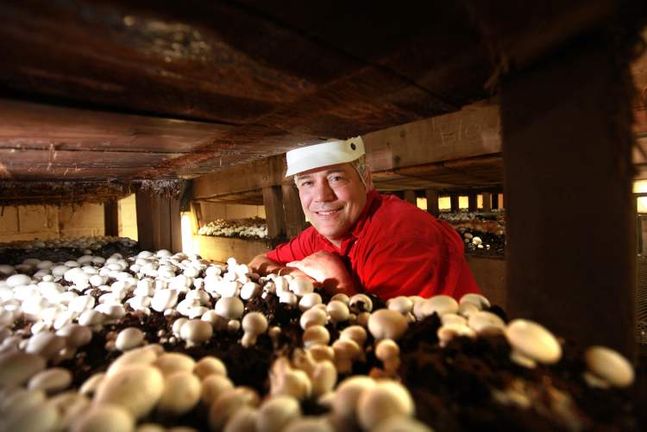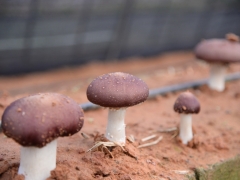
RUTH BonNEVILLE / WINNIPEG FREE PRESS Enlarge Image
Burton Loveday, president of Loveday Mushrooms, is facing his first local competition in 10 years.
A Winnipeg showdown could be brewing in Manitoba's staid commercial mushroom-farming industry, with a new upstart poised to take on the local industry giant.
Winnipeg's Loveday Mushroom Farms Ltd. has been the province's only commercial mushroom-farming operation since 2002, when its lone competitor -- Portage la Prairie-based K & G Mushrooms -- went out of business.

Enlarge Image
ADRIAN LAM / TIMES COLonIST Archives New competition may lower prices for mushroom-loving Manitobans. (POSTMEDIA TIMES colonIST)
But now another operator -- Portage la Prairie Mushroom Farms -- is about to rise from the ashes of K & G, taking over and upgrading its former mushroom-growing plant in Oakville, and replacing its former composting plant in Portage la Prairie with a new state-of-the-art facility.
That means a new competitor for Loveday, and another supply option for local retailers and food distributors who supply mushrooms to the restaurant and food services industry.
But whether it could also lead to lower prices for mushroom-loving consumers is anybody's guess.
The new company's spokesman -- Winnipeg real estate agent Devinder (Dave) Sangha -- has refused to talk to the Free Press about pricing or anything else until the operation is running. It's unclear when that will be.
"They're still having some problems getting equipment over from Europe," said Terry Simpson, a councillor with the RM of Portage la Prairie, said of the project.
"So I'm thinking (the plants) will open toward the end of July, at the earliest. And if it doesn't happen then, then it will probably be in August."
Simpson said Sangha told the RM the company is investing at least $6.5 million in the operation and it will create about 25 jobs.
He said the composting facility will be equipped with the latest technologies for reducing production time and objectional odours.
"They said there will be a small amount of odour, but nothing like it used to be (with K & G)."
Ken Keith, executive director of Central Plains Inc., the municipality's not-for-profit economic development agency, said the mushroom operation will not only provide new jobs, but new tax revenues for the RM.
"Essentially, it's the revitalization of the mushroom industry here," Keith said, which fits in well with other vegetable-growing and vegetable-processing operations in the area.
Loveday president Burton Loveday said he's aware of the newcomer, but he's not sure what to expect.
He said there have been other players in the past who undercut Loveday's prices in a bid to land customers.
"But that just accelerated their demise and hurts us in the process." He said the mushroom-farming industry has undergone tremendous change in the last decade or so, and is becoming increasingly challenging.
Loveday's sales, for example, have been essentially flat for the last three years, he said, while profit margins remain slim.
The CEO of Mushrooms Canada (formerly Canadian Mushroom Growers Association) said consolidation in the Canadian industry over the past 10 years has reduced the number of farms to about 40 from 100, and the survivors have invested heavily in new technologies.
Bill Stevens said today's mushroom farms are bigger, more efficient, produce a greater variety and better quality of mushrooms, and are all food-safety certified.
As for those stinky odours neighbours used to beef about, "that has pretty well been eliminated by taking the composting indoors," he said.
Loveday Mushroom Farms has also done all of those things, including investing about $3 million in 2003 and 2004 on indoor concrete composting bunkers for its 125,000-square-foot composting and production plant in St. Boniface. The new bunkers have enabled it to dramatically reduce the odours generated during the composting process, and also cut compost-production time in half.
murray.mcneill@freepress.mb.ca
Not your grandfather's mushroom farm
THE CEO of Mushrooms Canada said today's typical commercial mushroom farm "is not your grandfather's farm." And that's true of Winnipeg's Loveday Mushroom Farms, which has been in business for 80 years.
Not only is the family-owned operation bigger -- two plants instead of one -- more efficient, cleaner-smelling and food-safety certified, its product offering is also nothing like it used to be.
As late as the 1970s, Loveday grew only white mushrooms -- Number 1 or Number 2 Grade -- and sold them in one size -- a five-pound package.
Today, it grows white, crimini, shiitake, oyster and portobello mushrooms. They come in four sizes -- button, medium, large and jumbo -- and a wide variety of styles, including, whole, sliced, washed, with stems, and without stems. There are close to 100 different choices in all, according to company president Burton Loveday.
Loveday said the expanded offering is in response to changing consumer and retailer demands.
"They (the major grocery store chains) are always looking for something that will differentiate them from the competition," he said.
"So if that's what they want, we have to find a way to give it to them."
The growing number of immigrants coming to Manitoba has also been a factor, as different ethnic groups often have different preferences when it comes to mushrooms.
For example, oyster and shiitake mushrooms are popular with the Asian community, he said.
Republished from the Winnipeg Free Press print edition July 20, 2012 B4
























